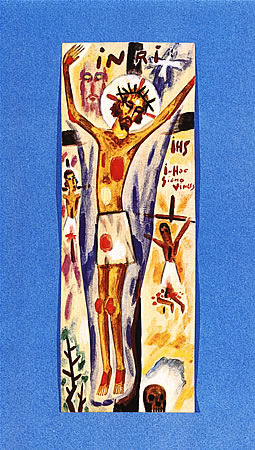In the passage from Acts for
this Sunday Paul preaches in front of the Areopagus, a rocky platform beside
the Acropolis in Athens. This is a key moment in the history of Christianity
and the world. Two great cultures meet for the first time -- the religion of
the Jews and the philosophy of the Greeks. Athens and Jerusalem are the
streams of thought and culture from which all the most important aspects of our
civilization take their origin – philosophy, theology, history, the arts, the
sciences and technology. Both Jew and Greek were passionately concerned to
understand how the lives of human beings could be rooted in reality, how they
could transcend individual fads and passing fashions, and be lived in harmony
with the whole creation.
 |
| St Peter -- Crivelli |
When the Epistle for this Sunday
says “even if you do suffer for doing what is right, you are blessed” it could
be taken to be stating one of Socrates’ most fundamental ideas. This shows that
-- despite Tertullian's famous question "What has Athens to do with
Jerusalem?" -- in certain ways Jew and Greek were not so far apart. But
while the Greeks looked to philosophy to understand the world (today it is
science to which people turn), Peter thinks a more fundamental requirement is
that ‘in your hearts you sanctify Christ as Lord’.
Paul is clear about this vital shift
of perspective. “The God who made the world and everything in it, he who is
Lord of heaven and earth . . .will have the world judged in righteousness by a
man whom he has appointed, and of this he has given assurance to all by raising
him from the dead”. The implication of this is that humanity needs more than
science or philosophy, valuable though these are. At bottom, the ‘Spirit
of truth’ is not something impersonal – knowledge -- but something personal --
love. It is only when we grasp this profound insight that our experience
of human nature (who we are) and of the human condition (the world in
which we find ourselves) can be fully reconciled. The world that God has made
for us may be studied as a physical system governed by causal laws of
"matter in motion". There is undoubtedly a lot to be learned from
studying it that way. But the Christian religion holds that inquiries of this
kind cannot sound reality's depths. Rather, the world is a cosmic
expression of Divine love, and animated by that love.
In the Gospel, Jesus identifies the
Spirit of Truth as a Holy Spirit and promises a truly remarkable kind of
intimacy with this love. We are not orphans in an alien cosmos because, he
says, ‘I am in my Father, and you in me, and I in you’. That is why Peter
thinks that a 'sanctified heart' matters more than intellectual understanding.

.jpg!Large.jpg)

